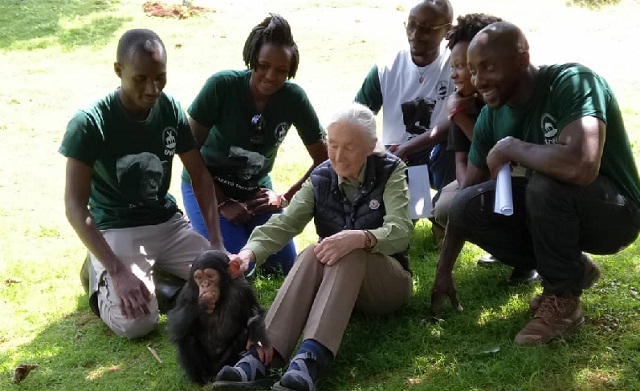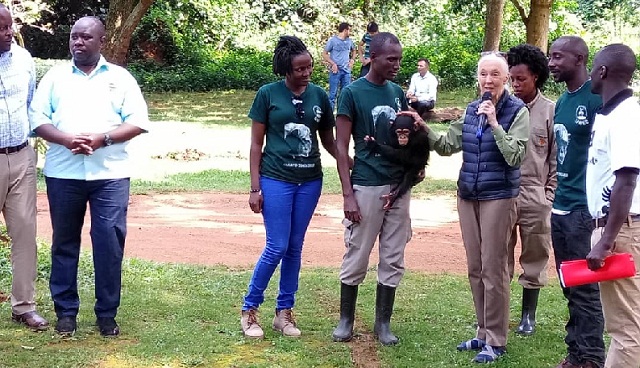
Renowned conservationist marks two milestones with eye on the children
Kampala, Uganda | RONALD MUSOKE | When Ngamba Island Chimpanzee Sanctuary— the forested 100-acre patch 23km off the Lake Victoria shore in Entebbe marked 20 years of existence recently— it was obvious who the chief celebrant would be; Dr. Jane Goodall herself.
Celebrated the world-over for her groundbreaking research and publications on wild chimpanzees, the renowned conservationist and primatologist was instrumental in setting up the sanctuary in 1998 through her Jane Goodall Institute.
She arrived on June 6 and stayed two days that marked the crest of week-long fun with the apes on Ngamba Island which is currently home to 49 chimpanzees. Many are orphaned and some are rescued from illegal pet and bush meat traders.
One of Goodall’s proudest moments during her visit was probably when a community leader described how they now live harmoniously with chimpanzees because of skills that Goodall had taught them.
“We now live with the chimpanzees like brothers and sisters,” said Henry Balemesa of Kasongoire Community Development Association in Masindi, western Uganda, who had travelled to Kampala with several members of his village to thank Goodall. They all stood up and cheered Goodall during a symposium organized in Kampala as part of celebrations of the Jane Goodall Institute’s 27 years in Uganda.
Balemesa said the fraternity between villagers and the apes was shown recently when a young chimpanzee fell in a pit and villagers rescued it. In the past, he said, this would have been impossible. Instead, it would have been the perfect chance for revenge.
Their village is right at the edge of Kasooha Central Forest Reserve in Kasongoire, Masindi District and the forest is home to an estimated 60 chimpanzees.
Balemesa attributed the harmony to the villagers’ understanding of chimpanzee behaviour from Goodall’s teaching, including what chimpanzees like and don’t like.
“We have also been sensitized on which crops to grow that are not good for chimpanzees,” he said, “So instead of maize, we now grow sunflower.”
Goodall always says her greatest contribution is educating people about the fact that animals, like human beings, have personalities and emotions.
As Balemesa concluded his praise of Goodall, he said he wished the Ugandan government could also help so-called frontline communities live in harmony with wildlife.
Goodall’s work in Uganda
Goodall agreed. She said the government through its agencies should enforce and strengthen conservation laws to reduce incidences of human-wildlife conflicts that appear to be on the rise.
She said conflicts persist because people searching for agriculture land, charcoal, and timber have encroached on the forest homes of the animals due to rapid human population growth.
Goodall said conservation, apart from protecting nature for future generations, promotes tourism which benefits the country today as people flock to see gorilla, baboons, and chimpanzee in the wild. There is fascination because, according to scientists, the chimpanzee DNA is 98.7% similar to humans, making them our closest cousins.
Chimpanzees are found in 21 African countries. In the past, there were millions of them but their population has since plummeted to between 170,000—300,000 across the equatorial Africa belt that stretches from southern Senegal through Central Africa to western Tanzania.
In East Africa the chimpanzees are found in the wild only in Tanzania and Uganda. Gombe National Park in Tanzania where Goodall first came into contact with the apes 50 years ago is the first park in Africa specifically created for chimpanzees.
Ugandan conservationists estimate that Uganda has about 5000 chimpanzee in the wild, mainly in western Uganda.
Since 1991, the Goodall Institute has been working in Uganda to reverse the decline in great ape populations by conserving their habitats which are mainly tropical rain forests located in western Uganda.
The institute’s programmes in Uganda and other countries in Africa tackle complex issues that threaten chimpanzees in the wild. They support sanctuaries, law enforcement to reduce trafficking, and public education to protect endangered species in the wild.
Peter Apell, the country director of the Jane Goodall Institute says protecting chimpanzees requires a comprehensive approach that addresses the needs of local people who are critical to chimpanzee survival.
This includes specific agricultural practices, community management enterprises, micro-credit programmes, and sustainable production techniques to boost people’s incomes while protecting forests.

Roots and Shoots
Another high point for Goodall was when the Queen of Buganda, Sylvia Nagginda, pledged to incorporate the Roots and Shoots’ values in her Kisakate programme. Nagginda’s programme encourages children aged 4 to 18 to stay in touch with Buganda’s cultural values.
Roots and Shoots focuses on nurturing young children to become tomorrow’s conservation stewards. It trains children in practical eco-social skills like tree-planting, paper recycling, waste disposal, and hygiene.
Started by Goodall in 1991 in Dar es Salam, Tanzania, Roots and Shoots, is one of the institute’s most rapidly expanding programmes. It has spread rapidly with more than 8000 groups ranging from two to 2000 registered members in more than 100 countries where they have planted millions of trees. It has been in Uganda since 2006.
Goodall, who is now 84-years old and no longer moves with boundless energy, said she wants to be remembered always for this programme because she wants children to take control of their future.
Speaking directly to some children who attended the symposium, she challenged them to “take matters into their own hands” with creativity, imagination, and determination.
“Let’s get Roots and Shoots growing because it gives the answer to the future,” she said, “Be obstinate like me, don’t give up.”
 The Independent Uganda: You get the Truth we Pay the Price
The Independent Uganda: You get the Truth we Pay the Price





